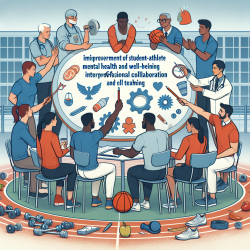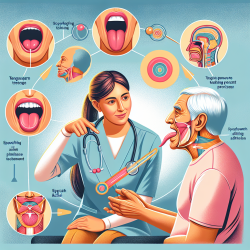Introduction
In recent years, the well-being of university student-athletes has become a focal point for athletic departments across the globe. This increased attention is largely due to the growing awareness of mental health challenges faced by athletes, exacerbated by societal pressures and the isolation experienced during the COVID-19 pandemic. The research paper "It Takes a Team—Enhancing Student-Athlete Health and Well-Being through an Interprofessional Approach" sheds light on the potential of interprofessional collaboration (IPC) to address these challenges effectively.
The Power of Interprofessional Collaboration
The Interprofessional Education Collaborative (IPEC) Core Competencies provide a framework for IPC, emphasizing values and ethics, roles and responsibilities, communication, and teamwork. Despite the clear benefits, implementing IPC in university athletic departments faces significant barriers, such as communication challenges, role ambiguity, and differing ethical standards.
Implementing Interprofessional Care
The research highlights a case study of an NCAA Division I interprofessional wellness team (IWT) comprising a clinical sports psychology doctoral student, a licensed mental health professional, an athletic trainer, and a sports dietitian. This team navigated barriers by adhering to IPEC competencies, focusing on proactive care rather than reactive responses to crises.
- Values and Ethics: The IWT prioritized confidentiality and ethical considerations, ensuring that all team members understood the boundaries of their professional codes.
- Roles and Responsibilities: Clearly defined roles allowed team members to leverage their strengths, enhancing the overall care provided to athletes.
- Communication: Proximity and community building were crucial. The establishment of an athlete wellness center facilitated face-to-face interactions and fostered a sense of community among team members.
- Teams and Teamwork: A shared leadership model empowered each member to lead in their area of expertise, promoting holistic care and well-being for athletes.
Recommendations for Practitioners
Practitioners looking to implement IPC in their athletic departments can draw valuable insights from this research. Key recommendations include conducting a needs assessment to identify resource gaps, engaging in interprofessional education, and fostering a culture of care through diversity, equity, and inclusion training.
By adopting these strategies, athletic departments can create an environment where student-athletes thrive both mentally and physically, ultimately enhancing their overall well-being and performance.
To read the original research paper, please follow this link: It Takes a Team—Enhancing Student-Athlete Health and Well-Being through an Interprofessional Approach.










